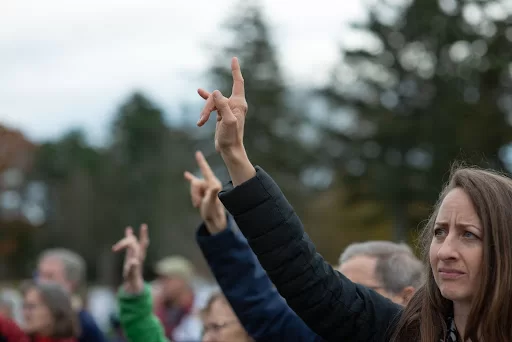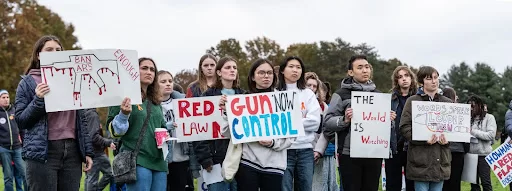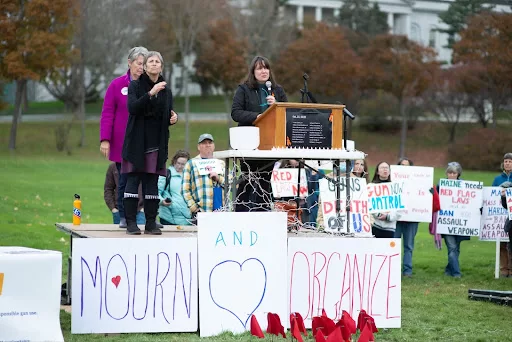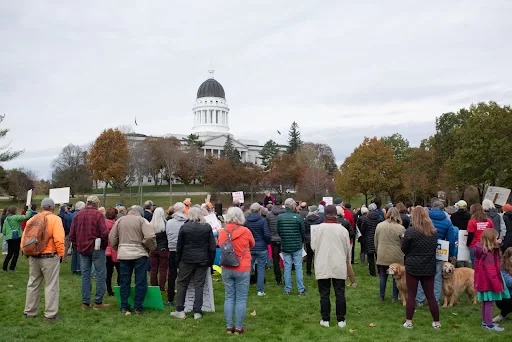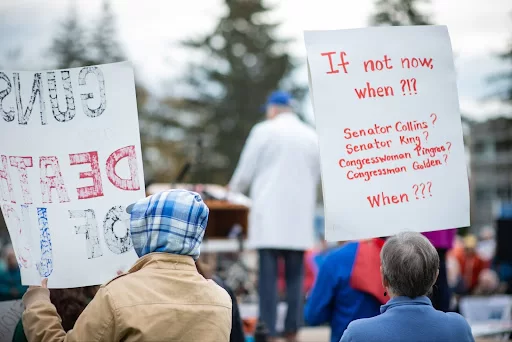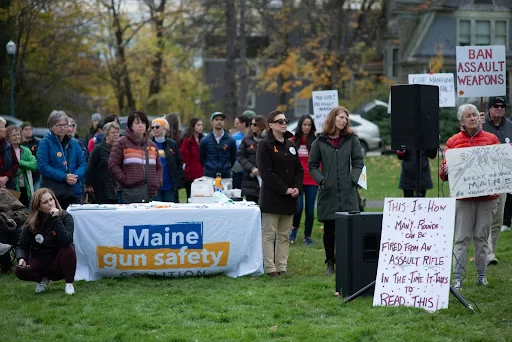Rallying for Gun Violence Prevention
Eighteen lives were taken on October 25, 2023 in a mass shooting that took place right here in Lewiston, the second largest city in Maine and home to Bates College. Including the gunman, nineteen lives were lost. It was one of the deadliest mass shootings in United States history, and it occurred in a place where most people assumed such a thing could never happen — in the northernmost state, with a population of only 1.3 million people, many of whom own guns and are proud of the state’s gun safety record. But it did, and the Lewiston community is still picking up the pieces, grieving together, helping one another, and grappling with questions like “why?” and “how?”
For many Americans, a key answer to those questions is too-easy access to guns. Many people throughout the country have been advocating for years for better gun control but have seen little change. Here in Maine, we have some of the laxest gun laws in the nation, including “Constitutional Carry,” which allows for the carrying of concealed weapons. Researchers note that “Maine has very few foundational gun safety laws. Despite 89% of gun deaths in the state being the result of suicide, the Pine Tree State lacks most basic laws that would help reduce suicide, including background checks for all gun sales, an Extreme Risk law, and waiting periods. Maine is also a permitless carry state.” (Everytown Research). As a result, gun control rallies are unfortunately not rare, and one took place in the capital city of Augusta in the aftermath of Lewiston’s mass shooting.
On November 4th, many Bates students joined other activists, including families – some with children and teens – state lawmakers, and a wide range of other Mainers at the State Capital for a peaceful rally hosted by the Maine Gun Safety Coalition. Despite the strong sense of shared purpose, one speaker noted that “It is not an occasion of joy that has brought us together, but a need was evoked for this rally to take place.” Attendees demanded more “common-sense” gun laws in the upcoming legislative session. Common-sense gun laws include an assault weapons ban (the kind of gun the Lewiston shooter used), a red flag law (prevents individuals who show signs of being a threat to themselves or others from purchasing or possessing any kind of firearm), a waiting period (which would act as a cooling down period), and background checks for those attempting to purchase a gun.
Speakers included a pediatric physician, who has seen personally the damage that assault weapons do: “Living in Maine, I felt disconnected from wider conversations about guns and gun control. Didn’t think think it would happen here. But guns kill more kids and adolescents than we think. The purpose of assault rifles is to destroy the victim by getting rid of as much tissue as possible. The exit wound from these weapons is greater than the entry wound.” Another speaker was a high school student from Yarmouth High School, who spoke with as much maturity and insight as a grown adult. She told a story about a conversation she had with her teacher about pulling the shades down and closing the doors to be quiet during a lockdown. “It was extremely concerning how calm our demeanors were when we spoke about this,” she reflected. As a student myself who has gone through lockdowns since elementary school, I have become detached from the drills, experiencing them with the normalcy of a fire drill. The wise high schooler ended her remarks with this provocation: “When did Americans’ right to safety become outweighed by the right to carry assault weapons?”
In advance of the rally, at Bates and across the state of Maine, protest signs were made, including ones like “Ban ARs, enough is enough,“ as well as ones that called out Maine’s elected officials: “If not now, when?!? Senator Collins? Senator King? Congresswoman Pingree, Congressman Golden?” Rep. Ben Collings was actually at the rally and spoke to attendees. Calling out himself and other legislators, he talked about the process of getting bills passed and how that had not been successful. “I have not done enough. We have not done enough.” Other speakers reminded attendees not to blame the mentally ill, nor use them as scapegoats for gun violence, when they are the ones most harmed by violence themselves. “It is the access to guns” that is the primary problem; without such access, mass shootings would be impossible.
Nearly one month later, we can start to ask ourselves what has changed since. And it does not seem like much. Speakers at the rally emphasized the need to use this momentum and keep showing up. . . keep showing up for the victims of this shooting, for the people of Lewiston, and for all the communities and families that came before. No one ever expects such horrific violence to happen to them, but if we do not do something as a collective, it will keep happening. A mom who works at Moms Demand Action offered this reflection: “I love how intertwined Maine is. When one town is hurting, the others hurt, too. We cannot let our friends and neighbors die. Twenty years ago, we didn’t know something like this could happen in Colorado at a school just like ours. Then the elementary school was terrorized by gun violence. And I figured things would change. And they have not.”
Throughout the rally, attendees chanted “Not one more” in unison. Not one more.
Picture credit to Michele Stapleton.
